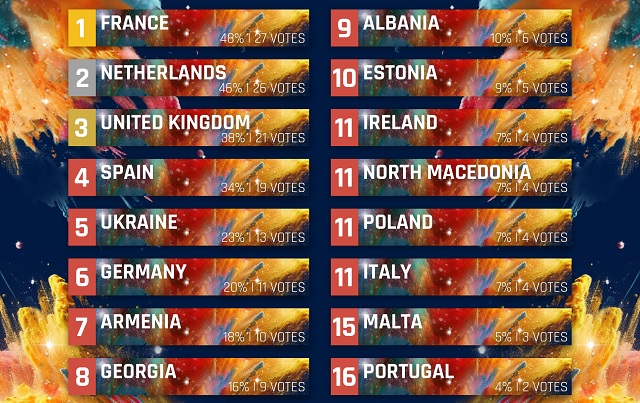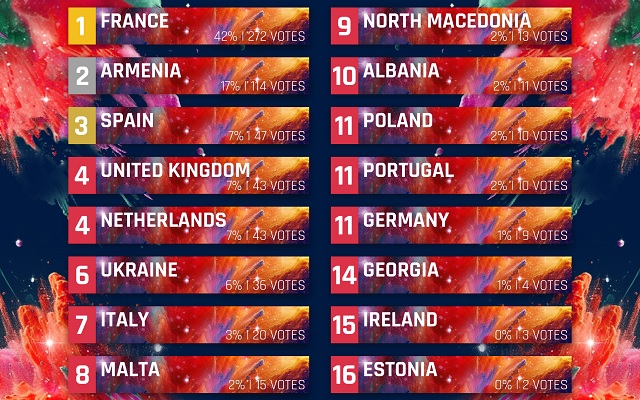Junior Eurovision is once again a great slice of Sunday afternoon entertainment. Having seen rehearsals I can confirm that there’s some great voices, top level staging concepts and that nostalgic warm feeling of believing our next generation will make the world a better place is ever present.
Beyond the 16 contestants you’ll have as always the common song, like last year at the start of the show, and you’ll see Amir perform ‘J’ai cherché’ alongside his latest hit and last year’s winner Lissandro with a big production of his 2022 winner. There is also an interval act of the Michael Jackson song ‘We are the World’ by previous French Junior Eurovision representatives that sits so much in the non-political politics of Junior Eurovision Zoë Jay spoke to us about at the start of this week.
It’s a very good show, sure perhaps not the big cultural importance of Yerevan last year, with Junior Eurovision’s biggest budget and a 20th anniversary celebration. But considering this is France’s 2nd hosting in three years, the significance of hosting is naturally a touch less. This is a very well produced Junior Eurovision and continues the brand’s upwards trajectory.
Yesterday gave us a chance to conduct two different polls. As is traditional for Junior Eurovision, they suggest a tight run affair. A press poll from the 1st rehearsal yesterday placed France one point above the Netherlands, with the United Kingdom, Spain and Ukraine making up the rest of the top 5.

The accredited press at Junior Eurovision gave their top 3 to vote in the press poll
In the evening an invited audience of French fan club members, local families and a smattering of pensioners were able to attend the jury show. We were one of numerous sites out with an exit poll in the chilly Mediterranean breeze. No surprise to see a French landslide victory with the home crowd, nor Armenia placing 2nd with a strong diaspora contingent, but the other countries following behind include the UK, Netherlands, Spain and Ukraine in a cluster too close to call.

The results of the audience poll outside the Palais Nikaïa in Nice
What do these six countries mentioned have at Junior Eurovision? Big budget numbers. These big players at Junior Eurovision are bringing full contingents of singers or backing dancers, props to fill the stage and levels of production that soar above the rest of the 2023 cohort.
At the bottom of the scoreboards have been nations like Estonia, Ireland, Malta and Portugal. Other than Ireland shoehorning Sophie Lennon’s spot back at Junior Eurovision, all are soloists on stage. To say the obvious, the more children on stage, the more it costs the broadcaster in flights and accommodation to bring families here. Margins are tight here for the smaller broadcasters or those broadcasting on secondary channels, and at Junior Eurovision those hotel rooms are a significant chunk of the puzzle. Portugal has only brought soloists on their six entries since returning in 2017, Malta have had at most two extra dancers beyond the artists since 2018, and in Ireland’s eight entries they have had combined 11 people on stage.
It’s no wonder that some of the Irish fans consider Sophie’s 4th place last year a moral victory, it’s the equivalent of a non-league team reaching the semi finals of the cup.
Yes, there are such cost differences at the main competition in May too, but with such commercial benefits to taking part in the Song Contest many countries find solutions, and the team behind the contest can bring in more diverse elements to let each song shine. The gulf between the haves and have nots is wider here at Junior Eurovision – and that is further exacerbated by a voting system where nations can vote for themselves, giving those big nations a head start as it is.
Nobody’s at fault here, and there’s still plenty to be joyous about going into Junior Eurovision, but we have seen in recent years how Spain has upped and upped their Junior Eurovision budget and are bringing bigger packages to match. Some can keep up, others simply can’t get close. If the top tier at Junior Eurovision treat this like the Premier League, the poorest are non-league in comparison. Estonia’s Head of Delegation has a day job running a topical news show for kids. The BBC brought Lee Smithurst fresh from being Head of Show in Liverpool. They are worlds apart in their day-to-day experience, and it shows on stage.
Ethically it feels Junior Eurovision should be a more equal playing field than it is today. Even the EBU’s mythical mathematical formulas don’t even up the playing field enough. This is a contest where money talks in creating successful creative visions that translate to points on the scoreboard.
I have full certainty that one of those haves will win Junior Eurovision again this year. And any of them would deserve to be a winner, I don’t write that begrudgingly at all. I just have a twinge of awkwardness knowing on the day of the final that some of these Junior Eurovision acts start from a place of such privilege compared to their competitors.
At least with this competition we can pretty certainly say that the result will be very close as always, so expect a nail-biter.









